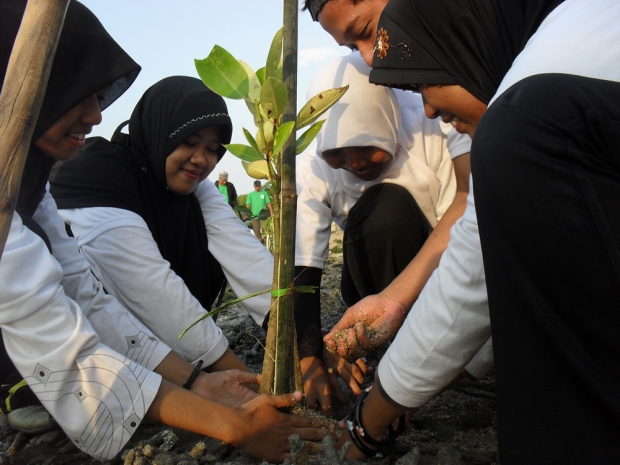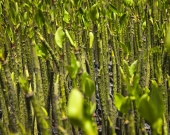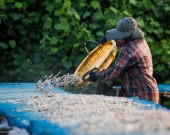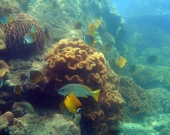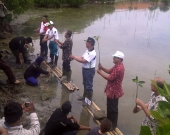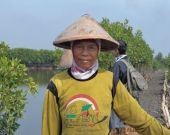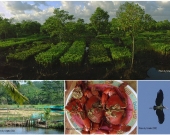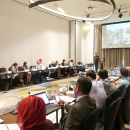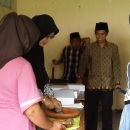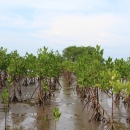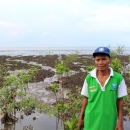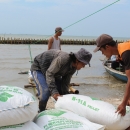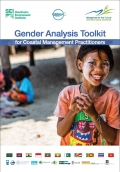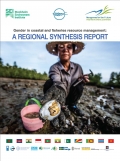MFF activities in Indonesia are supporting local communities to restore and manage coastal ecosystems in order to improve the benefits obtained. Priority is being given to building awareness on the economic value of coastal resources, and MFF across the region to supporting coastal livelihoods, climate change and resilience-building.
Local communities, including students, are learning about the importance of mangroves for storm protection, fisheries support, climate change adaptation and mitigation, and also their cultural significance. This is being achieved through community involvement and gender mainstreaming in mangrove rehabilitation activities, including seedling production, sound planting practices and generating new economic opportunities.
With a coastline of approximately 81,000 km in length and 17,504 islands, Indonesia is blessed with many coastal ecosystem types that provide a range of services and support high species richness. Indonesia’s main coastal ecosystems are mangroves, coral reefs, seagrass-beds, algal beds, mudflats, estuaries, and beach vegetations as well as small islands with their typical shallow waters. All of the coastal ecosystems represent an important type of natural resources for people’s livelihoods. In Indonesia, there is a long history of public and use of coastal ecosystems for and by various sectors, and also often for subsistence purposes.
Pressures on the coastal zone from human activities are due to various causes: high population densities in coastal areas, population growth, urbanisation and the impacts of tourism. Land based pollution, marine and coastal pollution, resource degradation and/or depletion are other important issues. In addition, the health and productivity of coastal waters have significantly reduced. Climate change will also pose further threats to sensitive coastal areas.
The management of coastal ecosystems and resources involves a multitude of government agencies, which can lead to overlap and jurisdictional conflicts/confusion. All activities for the coastal management from central up to district levels are defined on a sectoral basis and supported legally. The lead government agencies aim to implement Integrated Coastal Zone Management (ICZM) in a co-ordinated manner and the ICZM framework has been mainstreamed throughout the district-levels. Since Indonesia’s coastal areas are spread across administrative boundaries, the role of provincial government is very important.
Climate change considerations
A recent World Bank report gave the following prediction regarding the impact of climate change: “Indonesia is vulnerable to the impacts of climate change including prolonged droughts and floods raising serious food security and health threats while endangering the habitats and livelihoods of coastal communities. Global warming will also make sea levels rise, inundating productive coastal zones and reducing farming in such communities.”
MFF Indonesia will facilitate the inclusion of new emerging issues and new approaches into Indonesia coastal management, including climate change adaptation and mitigation. It has been proposed that MFF Indonesia will focus on district/local level management of coastal ecosystems, especially to improve awareness regarding the ability of coastal ecosystems to cope with climate change impacts.
MFF’s programme of work in Indonesia
The implementation of MFF in Indonesia is overseen by Indonesian National Coordination Body (NCB) consisting of a Steering Committee and a Technical Committee of main stakeholders. The Steering Committee guides MMF’s policy direction and provides advice accordingly to the Technical Committee. The NCB is supported by a Secretariat which is responsible for administrative and financial matters, including: day-to-day management, the review/approval of MFF proposals, monitoring and evaluation, supervision of ongoing projects and reporting.
A National Strategy and Action Plan (NSAP) and its associated workplan, guides the work of the NCB. Details of Indonesia’s programme of work can be found in the April 2008 National NSAP for Indonesia, the main elements of the NSAP, are summarised below.
National principles for Indonesia
MFF’s work in Indonesia is characterised by the following principles, it will:
- Adhere to the “Sustainable Development of Indonesia” principles.
- Address key resource use problems, constraints and conflicts in general, and those related to mangroves in particular.
- Facilitate a process of building knowledge, strengthening empowerment, and enhancing government especially at community- and district-levels.
- Facilitate the inclusion of new emerging issues and new approaches into Indonesia coastal management.
- Explore experiences of earlier or on-going coastal management efforts.
- Facilitate the co-ordination of NGO and public private partnerships with government programmes and actions.
- Facilitate the regional co-operation on MFF between member countries.
- Facilitate cooperation between Indonesia and the wider international community.
In terms of priority MFF Programme of Work (PoW) areas, a special focus will be given to the strengthening of district and local level ecosystem management and socio-economic development. The following intervention objectives will be prioritised:
- Support coastal livelihoods initiatives that are both sustainable and help to maintain natural ecosystems (PoW 8);
- Improve the resilience of coastal communities through coastal ecosystem management (PoW 9); and
- Increase awareness of the economic value of coastal ecosystems and use this to prioritise, promote and support coastal conservation and development actions (PoW 4).
Alignment to ongoing in-country initiatives and priorities
Relevant national projects related to MFF Indonesia include:
- Ministry of Environment/UNEP COBSEA pilot project linking climate change considerations to PoW 9 (i.e. building community resilience to natural disasters).
- UNDP project in the Mahakam Delta in Indonesia, which is also available to help test the CC proofing method/project cycle tools.
- At the national level MFF goals and priorities align with the following:
- A number of supportive national laws, including: Law No. 27/2007 concerning Coastal and Small Islands Management; recent Laws (Law No. 27/2007, Law No. 26/2007) on Spatial Planning and Law no. 24/2007 on Hazard Management represent an important framework for the implementation of ICZM; Law No. 32/2004 on Local Governance; and Law no. 25/2004 on Process on National Development Plan
- The National ICZM strategy has the essential elements for multi-lateral cooperation, and key principles of operation.
- Additionally, FAO Code of Conduct for Responsible Fisheries (1995) and the Indonesian Green Coast Programme (SMOE Regulation No. 3/2006) are examples of the success of legal measures and multi-sectoral approaches.
 Indonesia
Indonesia 